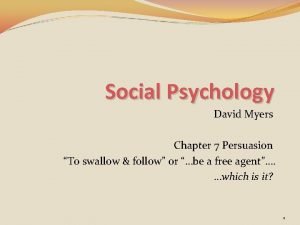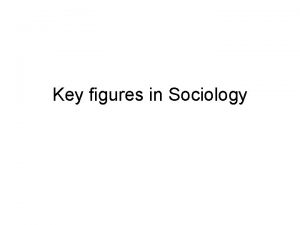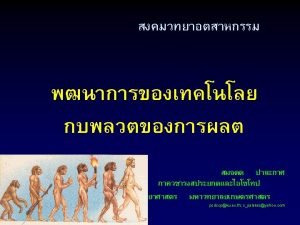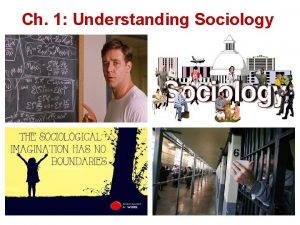THE SOCIOLOGY OF CULTS Key Concepts SSSoc C

















































- Slides: 49

THE SOCIOLOGY OF CULTS Key Concepts

SSSoc. C 3 Analyze social structure and interaction within society. e. Analyze the strengths and weaknesses of formal organizations and bureaucracies SSSoc. SC 1 Explain the process of socialization. d. Evaluate the agents of socialization including family, peers, education, media, and religion. SSSoc. SC 2 Analyze deviance in society. a. Explain theories of social control, include: control and labeling theories. b. Explain conformity in relationship to deviance and social control. c. Describe adaptation, cooperation, accommodation, and competition in the context of social control.

VOCABULARY Social stratification—ranking of individuals or categories off people on the basis of unequal access to scare resources and social rewards Cult—religious group founded on the revelations of a person believed to have special knowledge Ideology—system of ideas or beliefs that justifies some social, moral, religious. Political, or economic interests held by a social group or by society Denomination—well-established religious organization in which a substantial portion of the population are members Sect—a relatively small religious organization that has split off from a denomination because of doctrinal differences. Ethnic group Formal sanction Assimilation Authority Coercion

Press STUDIED BY SOCIOLOGISTS DURING THE 1930 S AS PART OF THEIR STUDIES OF RELIGIOUS BEHAVIOR. IN THE 1970 S, THE ACTIONS OF CULTS LIKE JIM JONES' PEOPLE'S TEMPLE CAUSED AN INCREASED INTEREST IN SUCH GROUPS. CULTS WERE FIRST DEFINED AS GROUPS OF PEOPLE WHO WORSHIPPED A DEITY (GOD).

The term "cult" has long been the subject of controversy. Some Christian groups label all smaller religious groups as a cult - especially those who do not share their own beliefs or who hold beliefs that differ from their own. Many sociologists prefer to call cults "New Religious Movements. " The vast majority of the thousands of small and unorthodox religious groups that exist around the world today are not dangerous to their members or to the rest of society. But, some are and/or have been.

SOCIOLOGISTS DEFINE A CULT AS A GROUP: (1) WHOSE BELIEFS ARE SEEN BY MOST OF SOCIETY AS BEING "STRANGE" OR UNORTHODOX. (2) WHOSE MEMBERS SHOW UNUSUAL OR EXCESSIVE DEVOTION TO SOME PERSON, IDEA, OR THING. (3) WHOSE LEADERS USE UNETHICAL AND/OR MANIPULATIVE METHODS OF PERSUASION AND CONTROL TO ADVANCE THE GOALS OF THE GROUP LEADERS

CULTS IDENTIFIED AS BEING "DANGEROUS" TO ITS MEMBERS OR TO SOCIETY SHOW ONE OR MORE OF THE FOLLOWING TRAITS: 1) members show unquestioning devotion to the group and its leader

press 2) Members are exploited and manipulated by the leader (s) of the group. David Koresh was accused of sexually exploiting his female followers - including young girls. In the Simpsons' episode, "The Joy of Sect. " The Movementarian leader is revealed at the end to be a con-man who uses his followers to make himself rich. Such has been the case with many a cult leader. Jim Jones took the savings and property of his People's Temple Followers and stashed it in Swiss bank accounts.

(3) members are subjected to physical/mental stress or harm press Under leader Warren Jeffs, female FLDS members were forced to marry at extremely young ages.

(4) the leader is a charismatic personality who claims to have some kind of exclusive knowledge or ability For example. Rael, the leader of the Raelians, tells his followers that he was contacted by aliens and selected by them as the one to whom they would reveal all the secrets of life on earth. Cult leaders use this claim to exclusive knowledge to gain followers and prevent them from being able to question his/her authority.

Charles Manson claimed to be "Jesus Christ" and have all kinds of special abilities. He claimed, among other things, that he knew connections between Beatles songs and the prophecies in the Bible's Book of Revelation. Having such "exclusive knowledge" is a common trait of cult leaders.

the United Nuwaubian Nation of Moors PRESS

(5) The leader controls members by telling them how they should think, act, feel, etc. , . The leader controls family and other interpersonal relationships - including sexual relationships. In group compounds, cult leaders will often separate husbands and wives from each other and/or from their children in order to control them or prevent them from leaving the group. 2, 000 couples took part in a mass wedding in New York City. The event was organized by the Reverend Sun Myung Moon, founder of the Unification Church, who matched many of the brides and grooms himself.

(6) The group leader isolates members from the rest of society. press

Isolation - Cults cut off members from the outside world (and even each other) to produce intense introspection, confusion, loss of perspective and a distorted sense of reality. The members of the cult become the person's only social contact and feedback mechanism. Cults may keep new recruits from talking to other new recruits. They may only be allowed to speak with long-committed members for a period of time. Cults may not allow unsupervised contact with the "outside world. " In this way, there is no chance for a "reality check" or validation of a new member's concerns regarding the group. Cults typically instill the belief that "outsiders" (non-cult members) are dangerous and wrong.

(7) The group members have their time and daily activities strictly controlled and regulated by the group leader. At Jonestown, cult members were kept busy 24/7 doing physical labor or attending endless "meetings" in the pavilion. Cult leader often do this to prevent people from being able to have time to think or consider their situation. It also keeps them exhausted and less likely to argue or fight.

At Jonestown, those loyal to Jones often reported anyone whom they heard saying anything bad about the settlement or its leader. Most of those identified as making such comments were humiliated and/or physically punished in front of the whole group. The climate of suspicion at Jonestown kept many people from trying to leave or telling their relatives about what it was really like there. (8) A culture of "reporting" is promoted among group members. Group members are told that it is their duty to report anyone saying or doing anything "disloyal" to the group or, especially, the leader.

MIND CONTROL Cult leaders often use a variety of mind control methods to manipulate group members. The use of mind control is one of the "red flags" indicating that a group is manipulative and quite possibly dangerous.

DECEPTION leader and other group members lie about the true purpose or goals of the group to attract new members and keep existing members in the group. L. Ron Hubbard—founder of Scientology

DEPENDENC Y leader forces members to become financially and/or emotionally dependent on the group. Also, by forbidding contact with friends and family outside the group, members are forced to depend on the leader for emotional/social support.

DREAD group members are instilled with fear that something bad will happen to them or their family members if they leave the group. Or, that they will not be able to survive in society outside the group or w/o the leader's guidance.

press

10 PSYCHOLOGICAL REASONS PEOPLE JOIN CULTS There are thousands of cults in existence, with millions of members all over the world. According to multiple psychologists and sociologists, there is no stereotype of the sort of person who would join a cult. In fact, it could be anyone of us.

# 10 Seductive Recruitment Process • A cult will promise to solve an issue in society that no one else is offering a solution to. • Offer a very structured lifestyle, with absolute answers to what is right and wrong. • Usually very open, loving, and welcoming. • At first, No obvious red flags to warn people.

# 9 Post-Breakup Blues People who are in a transitional period in their lives are the most vulnerable.

# 8 STRIVING FOR PERFECTION • Most cults teach their followers that they are superior to non-cult members. • “us vs. them” mentality • Leads to members being socially isolated

# 7 Finding Purpose in Life In times of uncertainty and confusion: • Extreme groups offer absolute answers to questions • People find comfort in seeing the world in terms of black and white • Cult leaders offer simple solutions to motivate people to devote their lives to the cause.

# 6 Low Self-Esteem One of the many tactics cults use to recruit new members: “love bombing. ” Very flattering to anyone with low self-esteem. However, once anyone begins to question or doubt the actions of the organization—shunning may be an option for punishment.

# 5 Women Are More Likely To Join Emma Cline, the author of the cult-centric novel called The Girls, explains that many girls are taught to seek attention and wait for men to notice and want them. Joining a cult is a way for some girls to feel that they are seizing control of their own destiny Plus, women statistically attend more religious gatherings than men—Think of church on Sunday morning. press

# 4 They Want Someone to Take Care of Them • Many cults form communes—free room and board in exchange for loyalty and obedience to leader • Many crave the security—especially if they did not receive the love and support at home • All adult responsibility taken care of by the organization

# 3 Trying to Save the World For idealistic young people, who have a deep need to make a difference in the world. EXAMPLE: Scientology Leah Remini was raised to believe that without Scientology, the world was doomed, and the fate of the entire planet was in their hands.

# 2 Fed Up With Society People join cults to escape the horrible injustices that they feel are in the world. Example: a few people joined The Children of God cult after their experiences in Vietnam. Many believed it was a highly religious movement that preached about the love of Jesus. (original name: Teens for Christ) that used sex to "show God's love and mercy" and win converts The founder of the movement, David Brandt Berg (1919– 1994)

# 1 They Have No Idea It’s A Cult Dr. Margaret Thaler Singer, a psychologist—studied brainwashing and cults • Brainwashing is done so gradually, people have no idea it is going on. • Most people don’t realize that cults does not have to be about religion • Political group • Business group • Lifestyle group

WHY ARE CULTS DANGEROUS/HARMFUL ? What happened at Jonestown in 1978 is the extreme example of why cults can be dangerous. However, the dangers they pose to most people are more subtle.

(1)Being in a cult can make it very hard for a person to function in normal society once they leave the group. In particular, it may be very difficult former cult members to make decisions on their own. (2) Cults can cause stress and frustration for family members whose loved ones are in a cult. Most cults isolate themselves and their members from society and family members. So, relatives spend a lot of time worrying about the safety and wellbeing of their loved ones in the group.

The Concerned Relatives were people who were worried about family members were living in Jonestown and tried to get their representatives to do something to help them get their loved ones out of the group.

(3) Children in cults are at a higher risk for abuse (sexual) and neglect. Since they are isolated from society, the leader (s) does not have to worry about being arrested or punished for abusing kids. (4) Some cults carry out acts of violence against themselves or others in society.

WHY DO PEOPLE LEAVE CULTS?

1) Some get tired of having their lives controlled by others - they want their independence back. (2) People finally see the hypocrisy and/or corruption of the group. Some people in The People's Temple left after seeing Jim Jones break some of his own rules. (3) They are persuaded to leave by friends or family members. (4) They are physically and emotionally exhausted from trying to meet the demands of the cults.

TERRI BUFORD, A TRUSTED AND DEVOTED GROUP MEMBER FOR YEARS, LEFT JONESTOWN AFTER DECIDING THAT JONES WAS ACTUALLY PLANNING ON CARRYING OUT A MASS SUICIDE WITH HIS FOLLOWERS IN GUYANA. SHE FEARED FOR HER LIFE.

DIFFERENT TYPES OF CULTS Sociologists have defined many different kinds of cults. However, one cult may have the characteristics of two or more of these categories. For example, The People's Temple could be classified as a religious/Christian-based cult and/or as a political cult - since Jones' followers had specific goals for changing society and were active in local politics. These general categories are useful in helping us to understand, in general, how/why cults are formed and what they are all about.

holocaust, war, or some act of God. Such groups are sometimes called “millennialists. ” They use the fear of such events to bring in followers and often isolate themselves from society in preparation for the final days. In at least two cases, groups have tried to "jump start" the chain of events leading to the final days by carrying out violent attacks. Even when the groups' prophecy of doom fails to materialize, followers often remain dedicated to the group. Go figure! They usually rationalize things by saying that "oh, it's just a delay. It will still happen sometime soon. "

Press David Koresh told his followers that only he understood the Book of Revelation and could recognize the events that would mark the beginning of the end times. When FBI and ATF agents arrived to investigate reports of child abuse and the stockpiling or illegal weapons at the Waco, Texas compound, Koresh told his followers that it was the start of the final battle mentioned in the Book of Revelation.

(2) Dangerous/Destructive Cults - these are groups that plan and carry out violent acts against their own members and/or innocent members of society. Their actions may or may not be tied to some kind of "end of the world" prophecy -- similar in that way to doomsday cults. The two labels can be interchangeable. For example, The Manson Family attempted to help their leader bring about "Helter Skelter" -- a race war that would ultimately lead to Manson becoming the leader of the world. To get this started, Manson ordered them to murder innocent people. The followers of the Japanese group Aum Shinikyro released deadly sarin gas into the Tokyo subway system in 1992. I would call these groups "dangerous. "


(3) UFO/Astral Cults - groups that believe in the existence of aliens and flying saucers are perhaps the most interesting brand of cults. Some, like the Raeleans, believe that life on earth was somehow created by aliens. Others, like God's Salvation Church, believed that God or some greater alien beings will someday come to earth to pickup their loyal followers. It is no coincidence that the appearance of UFO cults happened during the seventies -- when interest in aliens and flying saucers was a sort of national fad press

(5) Political Cults - cults that form around popular political groups and/or their leaders. Sometimes these are called "Cults of Personality. " Cults of personality have been formed around Adolph Hitler, Joseph Stalin (USSR), Mao Zedong (China), and others. Currently, the Great Leader of North Korea is the focus of a political cult of personality. Such leaders are shown to their people to be infallible and all-knowing leaders. People in North Korea are told that their Great Leader has invented just about everything on earth - including an invisible cell phone! I kid you not! And, that when he plays golf, he gets a hole-in-one on EVERY hole!!!!!!! press

(6) Established Cults - these are religious groups or movements that have some/many of the traits associated with cults, but they have become accepted by society.

(7) Commercial Cults - created around some product, company, or service. Commercial cults can also form in association with selfhelp programs or step-based financial programs. Commercial cults often produce infomercials that show members enthusiastically selling or endorsing a certain product, service, or program. Companies like Amway hold conferences at which members chant slogans and engage in other ritualistic activities designed to make them better salespeople. It's a little creepy if you ask me.
 Extreme persuasion how do cults indoctrinate
Extreme persuasion how do cults indoctrinate Sssoc
Sssoc Sssoc
Sssoc Key partners in business model
Key partners in business model Business model canvas tripadvisor
Business model canvas tripadvisor Key figures of sociology
Key figures of sociology Russian formalism theory
Russian formalism theory Key concepts examples
Key concepts examples Period 6 key concepts apush
Period 6 key concepts apush Compromise of 1877 apush
Compromise of 1877 apush Period 3 key concepts apush
Period 3 key concepts apush Apush key concepts period 2
Apush key concepts period 2 Key concepts of qualitative research
Key concepts of qualitative research Feminist therapy
Feminist therapy Reviewing key concepts reproductive barriers
Reviewing key concepts reproductive barriers Parole definition in linguistics
Parole definition in linguistics Apush unit 2
Apush unit 2 Apush college board key concepts
Apush college board key concepts Historical concepts ib
Historical concepts ib Apush key concepts period 2
Apush key concepts period 2 Apush key concepts period 1
Apush key concepts period 1 Key concepts in research
Key concepts in research Basic finance concepts
Basic finance concepts Apush period 9 key concepts
Apush period 9 key concepts Unit 1: basic economic concepts answer key
Unit 1: basic economic concepts answer key Chapter 17 promotional concepts and strategies answer key
Chapter 17 promotional concepts and strategies answer key 4 key concepts of media
4 key concepts of media Enterprise architecture key concepts
Enterprise architecture key concepts Adlerian theory key concepts
Adlerian theory key concepts Section 4 flatworms mollusks and annelids
Section 4 flatworms mollusks and annelids Business analysis core concept model
Business analysis core concept model Reformative theory
Reformative theory Rational choice theory key concepts
Rational choice theory key concepts What is the function of the chloroplasts
What is the function of the chloroplasts Culturalism
Culturalism Operation management course outline
Operation management course outline Key concepts of diversity
Key concepts of diversity Hát kết hợp bộ gõ cơ thể
Hát kết hợp bộ gõ cơ thể Slidetodoc
Slidetodoc Bổ thể
Bổ thể Tỉ lệ cơ thể trẻ em
Tỉ lệ cơ thể trẻ em Voi kéo gỗ như thế nào
Voi kéo gỗ như thế nào Chụp phim tư thế worms-breton
Chụp phim tư thế worms-breton Alleluia hat len nguoi oi
Alleluia hat len nguoi oi Môn thể thao bắt đầu bằng chữ đua
Môn thể thao bắt đầu bằng chữ đua Thế nào là hệ số cao nhất
Thế nào là hệ số cao nhất Các châu lục và đại dương trên thế giới
Các châu lục và đại dương trên thế giới Công của trọng lực
Công của trọng lực Trời xanh đây là của chúng ta thể thơ
Trời xanh đây là của chúng ta thể thơ Cách giải mật thư tọa độ
Cách giải mật thư tọa độ







































































